|
|
|
Sort Order |
|
|
|
Items / Page
|
|
|
|
|
|
|
| Srl | Item |
| 1 |
ID:
167398
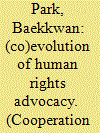

|
|
|
|
|
| Summary/Abstract |
How does the discussion of human rights issues change over time? Without advocates adopting a human rights issue in the first place, international ‘shaming’ cannot occur. In this article, we examine how human rights discussions converge and diverge around new frames and new issues over time. Human rights norms do not evolve alone; their prevalence, framing, and focus are all dependent on how they relate to other norms in the advocacy community. Drawing on over 30,000 documents from dozens of human rights organizations from 1990 to 2011, we provide a temporal overview and visualization of the ebb and flow of human rights issues. Using our new dataset and state-of-the-art methods from computer science, our approach allows us to quantitatively examine (a) how new issues emerge in the advocacy network, (b) the relationship of these new issues to extant human rights advocacy and information, and (c) how the framing and specificity of these issues change over time. By focusing on the process by which a new issue gets incorporated into the work of advocates, we provide an empirical assessment of the first step in the causal process connecting shaming to improvement in human rights practices.
|
|
|
|
|
|
|
|
|
|
|
|
|
|
|
|
| 2 |
ID:
166319
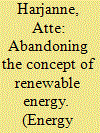

|
|
|
|
|
| Summary/Abstract |
Renewable energy is a widely used term that describes certain types of energy production. In politics, business and academia, renewable energy is often framed as the key solution to the global climate challenge. We, however, argue that the concept of renewable energy is problematic and should be abandoned in favor of more unambiguous conceptualization.
|
|
|
|
|
|
|
|
|
|
|
|
|
|
|
|
| 3 |
ID:
187033
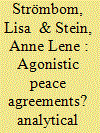

|
|
|
|
|
| Summary/Abstract |
Later years have seen the growth of a vibrant theoretical discussion on agonistic peace and the importance of creating space for contestation, plurality, and dissensus post-accord. However, there has been very few attempts at embedding agonistic theory in empirical analyses of peace agreements. This study attends to that lacuna by investigating how agonistic principles can be integrated and investigated in peace agreements. We suggest a threefold set of indicators for assessing the degree to which peace agreements are invested with agonistic dynamics: (1) what types of spaces for interaction are offered post-accord; (2) what forms of inclusion are stipulated; and (3) how is the peace agreement framed in terms of conflict termination and consensus/dissensus? We illustrate how the various indicators could be put into motion in concrete analyses applying them to examples from the Oslo Accords, the Belfast Agreement, and the Colombian Peace Agreement. Finally, we discuss four dilemmas and problematiques of integrating agonistic ideas in peace agreements; the issue of power, the mixing of agonistic and liberal ideals in peace agreements, the principle of ‘nothing is agreed until everything is agreed’ and the related double-edged potential of constructive ambiguity and finally the challenges of implementing peace agreements.
|
|
|
|
|
|
|
|
|
|
|
|
|
|
|
|
| 4 |
ID:
154742
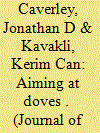

|
|
|
|
|
| Summary/Abstract |
Politicians (and journalists covering them) assume that association with the military has political consequences. We propose and experimentally test conditions under which military images have such effects. We presented subjects with images of the US president before varying backgrounds—including soldiers, students, children, and “ordinary” people. Only the image of soldiers has any significant effect, shifting participant preferences toward spending money on defense over education. The image does this by increasing respondent sense of threats to national security, despite the military’s depiction out of combat and in the background. The soldiers image does little to shift opinion about the president. However, the image has the largest hawkish effect on both the president’s copartisans and the strongest supporters. Given the routine use by many democracies of tactics unlikely to produce images of one’s fellow citizens in combat, the power of more sanitized images to cue hawkish policy preferences requires increased attention.
|
|
|
|
|
|
|
|
|
|
|
|
|
|
|
|
| 5 |
ID:
132170
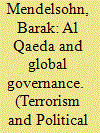

|
|
|
|
|
| Publication |
2014.
|
| Summary/Abstract |
In recent years, statements by al Qaeda leaders have included references to topics often associated with global-governance proponents' critique of the state. This article examines the organization's attitude toward symbols of global governance, giving particular attention to its view of the United Nations as the foundation for global governance, and to the manner in which al Qaeda approaches the central questions of environmental threats and human rights. The organization is seeking to insert itself into the discourse of global governance and use it in an instrumental manner; it focuses on anti-Western narrative and seeks to expose the existing order as designed by Western powers, particularly the United States, for self-serving reasons. However, the article argues, notwithstanding al Qaeda's reputation for sophistication in manipulating public opinion, the organization's references to global governance underscore the limitations its rigid ideology imposes on its messaging efforts. Even though adopting the global governance discourse is in line with the group's effort to improve its image, al Qaeda's extremist ideology limits its ability to take full advantage of the benefits this discourse offers.
|
|
|
|
|
|
|
|
|
|
|
|
|
|
|
|
| 6 |
ID:
159899


|
|
|
|
|
| Summary/Abstract |
Al Qaeda leaders have consistently praised the Chechen insurgents as an exemplary front of global jihad. Ayman al-Zawahiri recently applauded the steadfastness of the Chechen rebels and indicated that their resolve for jihad is worthy of emulation. Ever since the world found out about a war going on in the Muslim republic in the North Caucasus, Al Qaeda leadership has attempted to represent the Chechen struggle as one of its own battlefields. In turn, the Russian government has tried to justify its policies in the North Caucasus through demonstrating to the world that the Kremlin is fighting nothing less than Osama bin Laden’s agents in Chechnya. The North Caucasus insurgents in turn have embraced some of Al Qaeda’s narratives. While such narratives have proliferated, the factual evidence to show the direct links between the North Caucasus insurgents and Al Qaeda is still lacking. The article examines how terrorist groups such as Al Qaeda use framing for strategic ends. The evidence discussed here suggests that Al Qaeda, the North Caucasus insurgents, and the Russian government have adopted similar narratives. However, the lack of evidence to back up such narratives indicates the differences in reasons driving the convergence of the narratives.
|
|
|
|
|
|
|
|
|
|
|
|
|
|
|
|
| 7 |
ID:
157898
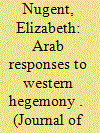

|
|
|
|
|
| Summary/Abstract |
Scholars have long held that Islamism—defined as a political ideology that demands the application of Islamic holy law and the deepening of religious identity—is in part a response to Western domination of Muslim lands. Drawing on the literatures on nationalism and international relations theory, we argue that Islamism is one of a menu of options that Muslims may adopt in response to Western hegemony—a menu that includes Arab nationalism and pro-Western accommodation. We hypothesize that a Muslim’s ideological response to Western domination is a function of the type of domination experienced—that is, military, cultural, or economic—as well as of individual-level characteristics such as intensity of religious practice. We test this hypothesis with a nationally representative survey experiment conducted in Egypt. We find that, among subjects in our study, pro-Western responses to Western domination were more common than “Islamist” or “nationalist” ones and that these were particularly driven by reminders of the West’s economic ascendancy. These findings suggest that foreign domination does not always yield defensive responses and often produces desires for greater cooperation with the hegemon.
|
|
|
|
|
|
|
|
|
|
|
|
|
|
|
|
| 8 |
ID:
166506
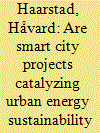

|
|
|
|
|
| Summary/Abstract |
The purpose of this paper is to investigate the links between smart cities and urban energy sustainability. Because achieving a “smart city” is a wide agenda rather than a specific set of interventions, smartness itself cannot easily be measured or quantifiably assessed. Instead, we understand smart cities to be a broad framework of strategies pursued by urban actors, and ask whether and how smart city projects catalyze urban energy sustainability. We use case studies of three cities (Nottingham, Stavanger, and Stockholm) funded by the Horizon 2020 Smart Cities and Communities program and examine how urban energy sustainability was advanced and realized through the smart city initiatives. We find first that while sustainability is not always a major objective of local implementation of smart city projects, the smartness agenda nevertheless increases the ambition to achieve energy sustainability targets. Second, the sustainability measures in smart cities are rarely driven by advanced technology, even though the smart city agenda is framed around such innovations. Third, there is significant sustainability potential in cross-sectoral integration, but there are unresolved challenges of accountability for and measurability of these gains.
|
|
|
|
|
|
|
|
|
|
|
|
|
|
|
|
| 9 |
ID:
111351
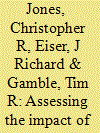

|
|
|
|
|
| Publication |
2012.
|
| Summary/Abstract |
In 2007 the UK government's public consultation on the future of nuclear power courted much criticism. Three studies were conducted to assess whether key arguments used by government within this consultation might have influenced public opinion about the technology. Participants first read a passage of text that made salient certain positive (climate change mitigation, increased energy security) or negative (nuclear waste) aspects of the nuclear debate. Participants then completed a task that required them to create an electricity mix for the UK by varying the contributions made by each of five energy sources (coal, gas, nuclear, renewables and electric import). Study 1 seemed to indicate that pitching the debate in terms of climate change mitigation was effective in increasing endorsement of nuclear power. The results of studies 2 and 3, however, contested this conclusion, suggesting that these arguments were having little direct impact upon participants' preferences for nuclear power. The results of these studies hold implications for UK energy policy and attitude assessment and can contribute to the understanding of how the arguments used by government in the 2007 consultation might have influenced public opinion.
|
|
|
|
|
|
|
|
|
|
|
|
|
|
|
|
| 10 |
ID:
144684
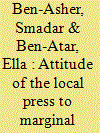

|
|
|
|
|
| Summary/Abstract |
This article examines the 2001‒2003 coverage by the local press in the Haifa region of the struggle of the fishermen who claimed to have contracted cancer as a result of coming into contact with the polluted water of the Kishon River. It shows that the local press chose to deliver to its readers an ‘interpretive package’ that portrays the fishermen as ‘The River’s Heroes’, a group fighting for justice and morality for the benefit of all. However, alongside the favourable framing were also some of the writers’ stereotypical elitist perceptions, at times explicit and at others implicit, of the fishermen. In the case of the Kishon fishermen, whereas the local press played an important role in covering their struggle, it only partially presented the solidarity dimension wherein the differences between people and groups constitutes the basis for moral relations between them.
|
|
|
|
|
|
|
|
|
|
|
|
|
|
|
|
| 11 |
ID:
139976


|
|
|
|
|
| Summary/Abstract |
Between the Lines: Indian Media’s China War is a quantitative and qualitative content analysis of the China coverage in India’s English-language press. The study identifies different kinds of adversarial and non-adversarial frames used in reporting China and classifies them according to their frequency of appearance. It examines the rhetoric and logic employed to activate the most common frames and puts them in the perspective of the politico-cultural predispositions that shape China-related news in India. Reviewing the content of two of India’s biggest selling newspapers, The Times of India (TOI) and the Hindustan Times (HT), in a 6-month period to determine the numerical spread of these frames, the study finds a generally conflictual tone of China coverage, with the dominant frames portraying China as a rival power inimical to India’s interests that needs to be resisted. With the Indian media as an example, this study offers a glimpse of China’s soft power deficit in a region where it is seeking to cement its leadership.
|
|
|
|
|
|
|
|
|
|
|
|
|
|
|
|
| 12 |
ID:
166667
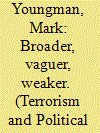

|
|
|
|
|
| Summary/Abstract |
In October 2007, veteran Chechen field commander Dokka Umarov proclaimed the formation of the Caucasus Emirate (IK), formalising the victory of the North Caucasus insurgency’s Islamist wing over its nationalist-separatists. During Umarov’s time as leader, the North Caucasus experienced sustained violence and the IK claimed responsibility for multiple terrorist attacks in and beyond the region. However, despite the importance of ideology in understanding insurgent behaviour, the IK’s ideology and Umarov’s role in shaping it remain understudied. Using Social Movement Theory’s concept of framing to analyse Umarov’s communiqués throughout his lengthy tenure (June 2006–September 2013), this article identifies three distinct phases in Umarov’s ideological positioning of the insurgency: nationalist-jihadist (June 2006–October 2007); Khattabist (October 2007–late 2010); and partially hybridised (late 2010–September 2013). The article contributes to debates over typologies of jihadist actors by highlighting the difficulties in applying them to the North Caucasus and provides a clearer understanding of the IK’s ideological transformation and the limits to its engagement with external actors. The article also illustrates that weakness was a key factor in explaining that transformation and identifies several avenues for research that could further enhance our understanding of the IK’s ideology and the role it plays.
|
|
|
|
|
|
|
|
|
|
|
|
|
|
|
|
| 13 |
ID:
074607
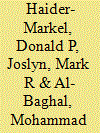

|
|
|
|
|
| Publication |
2006.
|
| Summary/Abstract |
In political disputes, issue frames set parameters for debate and shape which view dominates. This study expands issue framing research to examine the influence of frames on the perception of future terrorist threats as well as subsequent support for related counterterrorism policies. We test several hypotheses using data from an experimental field poll. We find that issue frames clearly influence perceptions of threat. However, our frames, which posit specific terrorism threats, only have a limited influence on respondent preferences for counter-terrorism policies. We consider a variety of explanations for these results and provide direction for future research.
|
|
|
|
|
|
|
|
|
|
|
|
|
|
|
|
| 14 |
ID:
104038
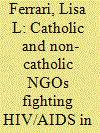

|
|
|
|
|
| Publication |
2011.
|
| Summary/Abstract |
While governments in sub-Saharan Africa work to provide in-country relief for the HIV/AIDS crisis, much health care and infrastructure comes from local or international non-governmental organizations (NGOs). The literature on NGOs suggests that collaboration increases their efficacy. Many non-Catholic NGOs do not work collaboratively with Catholic NGOs on HIV/AIDS, though the Catholic Church has rich and varied resources at its disposal for relief work. Observers often characterize the incompatibility of Catholic and non-Catholic NGOs as tactical, especially with regard to condom use. However, divergent issue framing is a critical and more fundamental distinction between the two groups. Contrasting the Catholic Church's unique spiritual frame with the scientific frame of many non-Catholic NGOs highlights the epistemological and teleological differences between the two. Reconciling these differing approaches, or finding ways to cooperate despite them, is a key element of promoting broader NGO collaboration on HIV/AIDS relief work. This theoretical analysis suggests directions for future empirical research.
|
|
|
|
|
|
|
|
|
|
|
|
|
|
|
|
| 15 |
ID:
112500
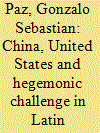

|
|
|
|
|
| Publication |
2012.
|
| Summary/Abstract |
Has China been a hegemonic challenge to the United States in Latin America in recent years? The article explores this question by setting a comparison with historical cases of instances of hegemonic challenge in Latin America, searching for similarities and differences, and looking for makers of rivalry as a way to start to distinguish perception from reality. I stress the instrumentality of framing issues, since they serve for internal mobilization and for control of allies. The article also attempts to illuminate the issue of how the United States has reacted to China's growing presence in an area historically considered within its sphere of interests, or "backyard," and about the dialogue between the United States and China about the region. It provides insights on the United States, China and Latin American countries' policy makers' thinking, collected through off-the- record interviews and closed-door debriefings.
|
|
|
|
|
|
|
|
|
|
|
|
|
|
|
|
| 16 |
ID:
146875
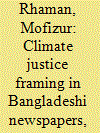

|
|
|
|
|
| Summary/Abstract |
Drawing upon the concepts of framing theory, this article explores, through close textual scrutiny, how two leading Bangladeshi newspapers have approached the issues of climate justice while covering three major climate summits, Bali 2007, Copenhagen 2009 and Durban 2011. The analysis reveals significant shifts in the treatment of issues related to climate justice by Bangladeshi journalists. Earlier coverage framed the problems mainly in terms of compensatory and distributive justice, but by 2011 disappointment, lost hopes and the need for activist movement are more prominent. The final analysis identifies important tensions between international developments and local engagement and perceptions, indicating that national and even local developments to address climate change problems in Bangladesh seem set to become more prominent news items in future.
|
|
|
|
|
|
|
|
|
|
|
|
|
|
|
|
| 17 |
ID:
171771
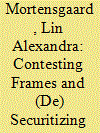

|
|
|
|
|
| Summary/Abstract |
This article bridges the Copenhagen school's (CS) framework and framing theory. Framing theory focuses on how a text frames its topic and is often applied to media sources. This is important because the media often is our sole source of learning about events and issues in the world. This article argues that bridging the CS framework and framing theory allow us to understand how the media conveys these issues and with what consequences. Through the bridging, the article makes two contributions to the existing debates on securitization. First, it introduces the concept of a (de)securitizing schema as an innovative way to analyze the media as a (de)securitizing actor. Second, the article uses the concept of a (de)securitizing schema to understand how contesting frames exist in the media. Empirically, the article analyzes two Danish case studies surrounding the migration movements on the European Union's southern border by undertaking a discourse analysis of four Danish newspapers. This empirical analysis shows how the media can be a securitizing actor, capable of employing multiple contesting frames—sometimes within a single news item. In addition, the Danish case illustrates how securitizing and desecuritizing frames evolve over time and from one case study to the next. The article concludes by reflecting on what the concept of securitizing schemas and contesting frames may imply for securitization studies and other case studies.
|
|
|
|
|
|
|
|
|
|
|
|
|
|
|
|
| 18 |
ID:
156244
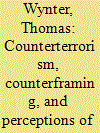

|
|
|
|
|
| Summary/Abstract |
Research on post-9/11 counterterrorism policy preferences in the West has focused primarily on the role of emotions and the magnitude of threat perception. In this article, I demonstrate the central role played by perceptions of the nature of the terrorist threat. Specifically, I focus on the divergence between the dominant depiction of terrorist irrationality in elite discourse in Australia and the strategic model in the academic literature. Reporting on the results of a randomized survey-experiment (N = 803), I find that exposure to excerpts from the academic literature significantly increases perceptions of terrorist rationality. Perceptions of terrorist rationality, in turn, correlate with lower levels of support for military responses to terrorism. While exposure to descriptive text about a terrorist attack increases support for military responses to terrorism, subsequent exposure to excerpts from the academic literature mitigates this effect, reducing support for military responses to terrorism.
|
|
|
|
|
|
|
|
|
|
|
|
|
|
|
|
| 19 |
ID:
163914
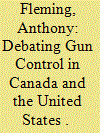

|
|
|
|
|
| Summary/Abstract |
The weakness of the antigun lobby in the United States is attributed to the “collective action problem” of trying to mobilize “free riders” behind a public purpose. But the Coalition for Gun Control emerged in Canada to successfully lobby for the Firearms Act of 1995. If the “collective action problem” is not limited to the United States, then are its effects “mediated” by political culture? To address this research question, we content analyze (1) media coverage, (2) party platforms, (3) presidential, and (4) ministerial rhetoric. Three frames represent “restrictive” gun policies that ban or regulate firearms, “punitive” gun policies that penalize the person for the unlawful use of firearms, or “lenient” gun policies that encourage gun ownership and gun rights. Marked differences in framing the gun debate help explain why an antigun coalition emerged in Canada but not the United States.
|
|
|
|
|
|
|
|
|
|
|
|
|
|
|
|
| 20 |
ID:
170657


|
|
|
|
|
| Summary/Abstract |
The South China Sea disputes involve both island and maritime claims among several sovereign states within the region, namely China, Malaysia, the Philippines, Brunei, Vietnam and Taiwan. Framing an analysis of international news and diplomatic relations allows researchers to examine how news organisations provide their audiences with context regarding news stories through content promotion and exclusion. This study examined how the Malaysian and Chinese newspapers reported about the South China Sea disputes and Malaysia–China bilateral relations. The findings indicated that the newspapers reported the topics with different intensity and prominence, while different news sources were employed. It was also found that conflict was a salient frame used by the various newspapers. In addition, this study found that the Malaysian and Chinese newspapers exhibited different valence in reporting the South China Sea disputes. Among the Malaysian newspapers under examination in this study, Sin Chew Daily (a Chinese-language daily) employed the most similar frame to that of the Chinese newspapers, where the coverage was pervasive with supportive valence towards China.
|
|
|
|
|
|
|
|
|
|
|
|
|
|
|
|
|
|
|
|
|